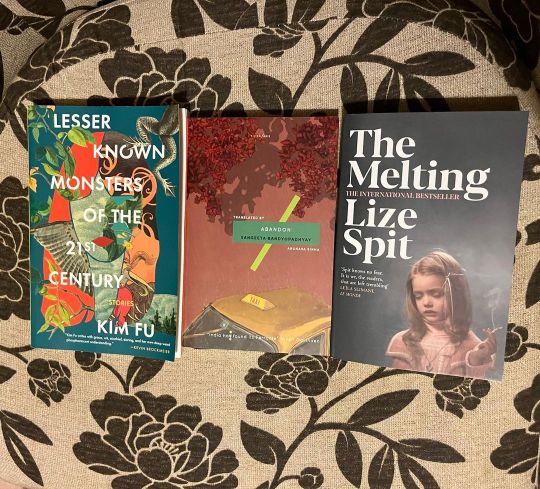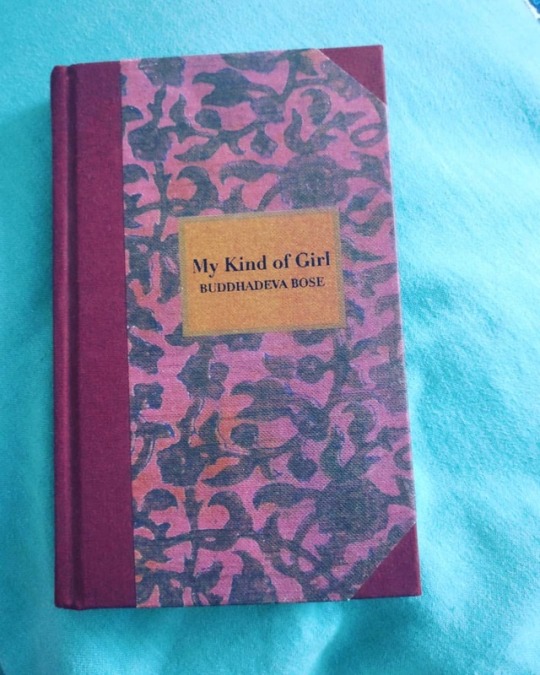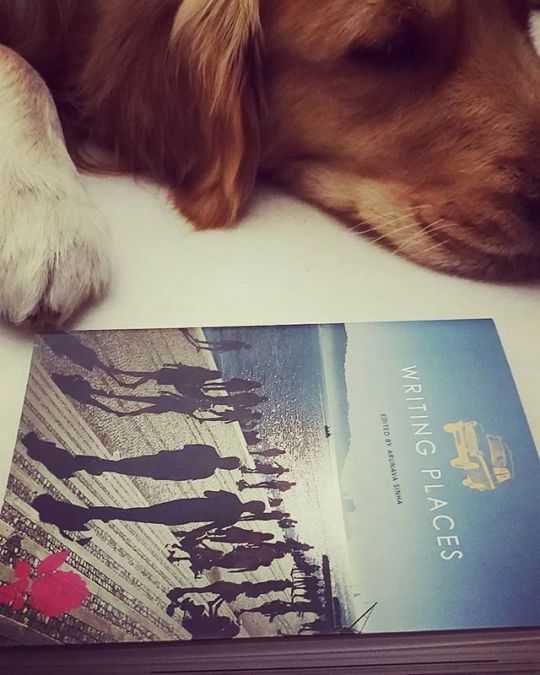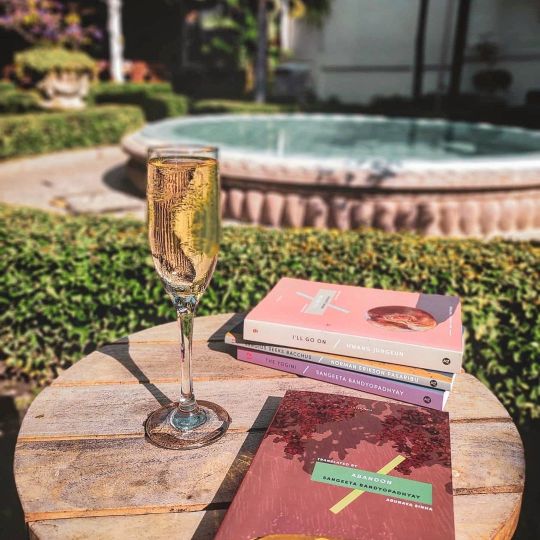#arunavasinha
Photo

Hello everyone, it’s finally Friday! 😅 Hope your weeks have all gone well. It’s time for another book haul. Lesser Known Monsters has been on my wishlist for quite some time and I finally succumbed to its call 😂 Described as twelve unforgettable tales, the strange is made familiar and the familiar made strange. A girl growing wings on her legs feels like an ordinary rite of passage, while a bug-infested house becomes becomes an impossible, Kafkaesque nightmare. This collection blurs the boundaries of the real and fantastic, offering intricate and surprising insights into human nature. Abandon is my latest @tiltedaxisbooks buy in my quest to acquire them all. Translated by Arunava Sinha, this is a powerful novel about a woman who runs away from home, seeking to free herself from the shackles of society and familial attachments, and instead devote her attentions to writing a novel. When she realises her five year old son has followed her, she struggles with her identity and responsibilities as a mother versus the guilty knowledge that she cannot want her own child when his existence required her to suppress her own dreams. Finally, look at that cover of The Melting! Translated by Kristen Gehrman, this book asks the question “what if you could take revenge on an entire village?” That’s all I need to know! I’d love to know your thoughts on any of these books or authors. Let’s have a chat in the comments! #bookstagram #scottishbookstagrammer #ohlookmorebooks #anotherbookhaul #lesserknownmonstersofthe21stcentury #kimfu #abandon #tiltedaxisbooks #readingbooksintranslation #sangeetabandyopadhyay #arunavasinha #themelting #lizespit #kristengehrman #bookobsesseď https://www.instagram.com/p/ClrUzP5Ld2F/?igshid=NGJjMDIxMWI=
#bookstagram#scottishbookstagrammer#ohlookmorebooks#anotherbookhaul#lesserknownmonstersofthe21stcentury#kimfu#abandon#tiltedaxisbooks#readingbooksintranslation#sangeetabandyopadhyay#arunavasinha#themelting#lizespit#kristengehrman#bookobsesseď
1 note
·
View note
Photo

As I begin to write this, I'm trying to pin down what this story is about- India's first lady doctor or child marriage? Does it catch the Indian women emancipation movement in its nascent stages or capturing the downfall of the last nawab of Awadh is its aim? It's all this. Which is part of its charm & also the reason why it overpowers you. But let's start from the beginning. Krishnosundor & his family leave their village with a promise of better days but life sells them off as plantation slaves. His sister, Bhubonmoni, his two daughters & his wife- their lives form the crux of this story. The first 150 pages pulled me in; the story took off immediately but I found myself emotionally overwhelmed. I asked @pepperandpetals the one who loved this book and gifted it to me, if things get better. She encouraged me to continue reading & I am glad I listened to her. The story is well-researched & apart from the protagonists there are others who held my interest- I mean, Rabindranath Tagore is practising his poetry & Kadambini Ganguly is studying to be a doctor here. The tapestry is rich with memorable characters, sewn with the silk of the Indian history. @arunavasinha has done a fantastic job with the translation and I wish @debarati.mukhopadhyay more success with her book. The Indian historical fiction scene is richer because of her work. Trigger warnings: Child marriage, rape, gender & caste issues. #chroniclesoflostdaughters #bengalitranslatedliterature #debaratimukhopadhyay #delhibookstafam #delhibookstagrammer #indianbooks #historicalfiction #translatedbooks #indianreader #indianbookstagrammer #bookstagraminda #translatedliterature #alwaysreading #bookblogger #bookishthoughts #bookdragon #2023readingchallenge #readingchallenge2023 #januaryreads #delhireaders (at India) https://www.instagram.com/p/CnoYS4Vr1MC/?igshid=NGJjMDIxMWI=
#chroniclesoflostdaughters#bengalitranslatedliterature#debaratimukhopadhyay#delhibookstafam#delhibookstagrammer#indianbooks#historicalfiction#translatedbooks#indianreader#indianbookstagrammer#bookstagraminda#translatedliterature#alwaysreading#bookblogger#bookishthoughts#bookdragon#2023readingchallenge#readingchallenge2023#januaryreads#delhireaders
0 notes
Photo

After reading his morning post to tag books and thank translators on the occasion of international translation day, I could not have resisted posting this. I smiled to myself, took out the copy of this beautifully translated and produced, 'My Kind of Girl' written by Buddhadeva Bose. Translated from Bengali by my ex-boss and the most accomplished one in business I know of - Arunava Sinha @arunavasinha aka Bultu. And guess what, this one is a signed copy from the man himself! 💓 (It was a short meeting at Network 18 offices and I was rewarded with this book.) It's been 8 long years! Which means, it's time to re-read this one. Thank you, once again, Bultu. 🙌 . . . . #love #books #mykindofgirl #arunavasinha #buddhadevabose #translations #fiction #bengali #english #worldtranslationday #bookstagram #bookworm #internationaltranslationday #books #bookslovers #penguinrandomhouse #delhieyes https://www.instagram.com/p/BoWqpb8jMha/?utm_source=ig_tumblr_share&igshid=1995bwfmyhvlo
#love#books#mykindofgirl#arunavasinha#buddhadevabose#translations#fiction#bengali#english#worldtranslationday#bookstagram#bookworm#internationaltranslationday#bookslovers#penguinrandomhouse#delhieyes
0 notes
Photo

Homi, a woman from a middle-class family and a television journalist is married to Lalit, a banker. They do have a happy marriage, never lack of money and sex is always great. So why does Homi feel like something is missing and she is in need for looking for that missing piece? Things have changed after Homi is stalked by a hermit on the road. She then becomes obsessed with fate and destiny leading her into somebody with different personalities. Her 'new' behaviour causes her relationship with Lalit crumbling. She later keeps searching for the answers she is looking for: certain aspects of her life and how much her fate controls her. Her search lands her in Benaras later. Yet The Yogini is more than that. It is written from Homi's perspectives herself: woman from dysfunctional families who sees things differently from common people. She explores the dynamics of a relationship, class differences and the gender stereotype in the society that favours men. I always love the way Sangeeta portrays her heroine. They are always portrayed as a free-spirited woman who is sexually liberated even when they're exploring their female sexuality or undergo an erotic escapades. Sangeeta's wmen are portrayed as a human with their lust, their desire, their loneliness and the urge to love and to be loved. Those women do not only become a mirror but also challenge the system in our society that laments women who seeks their (also sexual) freedom. The Yogini to me comes as unconventional read and will make you question. It makes me questioning the meaning of womanhood and freedom. Yet it is very entertaining because the language used is so crunchy and easy, making this book digestable in one bite. BOOK 12: THE YOGINI by SANGEETA BANDYOPHDYAY @sangeeta_sankhini for my #ReadTiltedAxis Month Translated by: Arunava Sinha @arunavasinha 📍 India Published by @tiltedaxisbooks/ @tiltedaxispress (at Desca's Library) https://www.instagram.com/p/CNmOg1ZraoV/?igshid=1xxnbvgo85wj4
0 notes
Photo

The Writing Places anthology, ed @arunavasinha , published @seagullbooks , is finally out! I have a short story in it.It's called Peregrine Falguni and is set in near-future Calcutta Club, where a group of high-society parents gather over several years to discuss the progress of their children, all of whom are under 24 hour surveillance. / on Instagram http://bit.ly/2WGw2SV
0 notes
Quote
All sorrows are not sacred, all dreams are not for telling others, all roads do not lead to Rome, all love is not for women, not every white sheet of paper wants to be sullied, all windows cannot be opened, not all poets are treacherous.
Sunil Gangopadhyay
Translated from Bengali by Arunava Sinha
0 notes
Photo

A woman, running away from home and abandoning her societal and familial responsibilities that has worn her out and tied her tightly. Her main purpose is only to pursue her dream: writing a novel as she considers herself as some kind of female Picasso in the writing business. Is it easy? Nay, she has her five-year-old son Roo that comes and follows her around. That woman, Ishwari struggles not only to find a place to stay for her and her son but also how to survive on daily basis. It’s a tough world we are living in, baby! With all the beliefs that women are considered as a perfect creature when they’re able to fullfil their duty in bearing children, I really love how Sangeeta brings the notion of womanhood and motherhood in this novel. It challenges the society which always puts more restriction and limitations on women. How motherhood can be seen as an achievement yet it's also a restriction. Please, do not expect that Sangeeta will be straightforward in her stories. She will likely write dark stories and she leaves all of her stories open for any interpretations. The character of Roo and his relationship with his kum Ishwari here for example. Yet one thing you should notice is how great she is in portraying her female characters. Each of the heroine is portrayed as a powerful creature who challenges certain value in the society. Somebody who challenges the social system: the legal documentation for a single mother, child wellfare, woman's freedom to (not) become a mother. Yet they are also portrayed as a human who has the emotion and is in the urge to find their own happiness, pursue her dreams. An (often) oppressef woman who experiences lust, loneliness, and love-starved. I was on a buddy read with Anggie @oryzzay on this book. Ah a book every (wo)man needs to read…. The book is available to purchase for an affordable price at @periplusid and @periplus_malioboro BOOK 6: ABANDON BY SANGEETA BANDYOPADHYAY @sangeeta_sankhini for my #ReadTiltedAxis Month Translated by: Arunava Sinha @arunavasinha 📍India Published by @tiltedaxisbooks @tiltedaxispress (at Desca's Library) https://www.instagram.com/p/CNVA4fJLj43/?igshid=1deu2mu69disb
0 notes
Photo

Panty tells a story about a lady who moves into the guest house and she finds out a pair of discarded and used undies in the wardrobe. She later wears those undies and since then she starts living in a 'time-machine.' She starts to have the vision about a woman and surprisingly, the sex lives between these two women interwine in the dream-alike-time-machine sequence. I indeed faced some difficulties in reading the first parts of the book. The plot is not in sequence and they seem like keep changing the narrator which is confusing. The transition between two women goes back and forth and it does not help at all. Yet one of the important things higlighted here is the way Ms. Bandyopadhyay portrays womanhood through dark eroticism. Interesting ha! In most books, men will likely be the ones taking control in the sperm-soaking department. However, Ms. B shows an opposite fact. The female sexual expression which is often repressed in the so-considered (Asian) traditional society is being explored here. She shows her readers that sexual desire is the purest form in the human life and women do possess it as well. Women do have desire and there is nothing wrong with women who are sexually liberated or men whose penis cannot get a hard-on (It's pathethic but sheesh happens too tho and there's nothing wrong with it). I also enjoy reading the second novella too. It is still an interesting read. The notion about religion and one's belief is well-narrated even it's just a short novella. Anyhow, I am glad I read both novellas and I thank @arunavasinha for translating this book and making it digestable for us- the readers to read. I look forward to reading more of Arunava Singa's and Sangeeta Bandyopadhyay's works. Thank you for this awesome gift you blessed me with, @post_santa . BOOK 1: PANTY BY SANGEETA BANDYOPADHYAY Translated by: Arunava Sinha 📍 India Published by @tiltedaxisbooks @tiltedaxispress (at Desca's Library) https://www.instagram.com/p/CMx0zb6r6St/?igshid=22bccm36kdjz
0 notes
Text
The Shadow by Manik Bandyopadhyay
I almost went mad after the death of my first wife. I didn’t eat on time, didn’t leave my corner of the room, read books on ghosts and spirits all the time, and pondered in silence. I loved my wife so much that even after conducting her last rites at the crematorium, I did not believe that she had indeed been converted to vapour and ashes, that she was nowhere in this world anymore. I was convinced that she would return, that I would see her again. Just in case she proved hesitant about returning in the presence of other people, I sent the rest of my family home. I had no concern for earthly pleasures. I engaged a maid and a cook, accepting all their arrangements. I became so irritated and angry when they came to me for instructions that they avoided me out of fear. Gathering four or five large photographs of my wife in a room, along with her clothes, her cosmetics, her embroidered slippers, the notebook she used to keep accounts, and a thousand other mementos, I spent all my daylight hours in there. In the evenings I moved to the room in which my wife had died, changing the sheets of the bed on which she had breathed her last, and placing two pillows side by side. I passed the nights in wakefulness, by turn sitting, lying down, reading, and casting expectant glances around me. Having spent a month or so in this way without even a momentary glimpse of my wife, I was beginning to grow despondent - when it struck me one evening that perhaps she was not visiting me because I kept the lights turned on. As soon as the thought occurred to me, I switched off the lights. I had goosepimples of delight. As soon as I turned out the lights, I saw my wife sitting on the floor, leaning against the wall, in the form of a shadow. Her incorporeal body emitted an aura which lit up a rectangular area around her, like a photo frame. The same loosely piled up hair, the same peak at the forehead, the same sharp nose and shapely chin. Even the end of her sari, which had slipped off her head to encircle her neck, was clearly visible. I stood stock still, gazing at her. A long time later she rose to her feet, raising her arms and yawning in the way I knew so well. Now the silhouette of her body was even clearer. She stood there for another minute or so before moving a yard or two sideways and melting into the faint darkness in the room. Only the glowing rectangular frame around her remained undistorted. My legs wavering, I walked up to the bed and slumped on it, falling asleep at once. My indisposed body and spirit could not endure the exhilaration of her miraculous appearance. I began to see her every day after this. I would wait in the room before evening fell. As the darkness deepened, the dazzling rectangle would appear on the wall like a backdrop. On some days she would sit close to the wall as before, while on others she would move about restlessly. Now and then she would turn her back to me, arrange her hair in a bun on her head, and enact my favourite pose from the time she was alive. Sometimes she would even go through the motions of conversing with me, waving her hands, but soundlessly. How could she produce a sound? On my part, I did not attempt to talk to her or to go up to her and touch her. I was aware that it is impossible to talk to a shadow or to touch it. I would only gaze at her. That was enough to lighten the pain of being parted from her. Only, I would suffer greatly when she appeared indistinct and distorted. I could make out that she was trying to assume the shadowy form, but without success. Who could tell how much agony this caused her? We had an unusual consummation one day. Although she could not break through the insurmountable barrier between material and spirit, I was able to do it with the help of my strong willpower. That day I had read up, in an English book on the afterlife, the methods by which a living being can acquire the form of a spirit. As soon as she appeared against the illuminated backdrop that night, I saw my shadow embrace her from the back. In an instant I forgot the infinite gulf with my departed wife. In my intimate embrace her limp, unmoving body grew as warm and pulsating with the emotions of living as before. I had no doubt whatsoever that it was her flesh and blood body which I had clasped to my breast. I felt the touch of her hair and of her skin, her warm breath falling on my cheek. I even felt the weight of her body. Can a shadow have weight? I do not remember what happened after this. I had grown used to my wife’s shadowy presence, but being able to touch her in flesh-and-blood form made me lose consciousness. The possibility of killing myself to join my wife had been on my mind since the day of her death. After this incident I was not inclined to remain on earth a single day longer. The next day I bought two portions of opium. I decided that, once my wife had appeared that evening, I would consume the opium and lie down in her presence. Before night could turn into morning, the difference between our respective existences on the planes of life and death would vanish. That evening her shadow appeared even more clear and flawless. Whatever little apprehension I had had about suicide disappeared after seeing her. I shut the door, and, at once, not just my wife’s shadow but also the halo of light around her vanished. I had never seen the glowing backdrop vanish along with her. I could not understand. I opened the door again. The light and my wife’s shadow both took form once more on the wall. I looked out and discovered the maid sitting outside the door, waiting for someone. The light at the turn of the stairs was casting its beams directly into my room. I’m told I went insane for a year or so after this. I am not at all mad now, and I have remarried. But what is surprising is that I still believe in ghosts and spirits.
- Translated from Bengali by Arunava Sinha
4 notes
·
View notes
Quote
Just a girl, nothing more, facing the mirror, doing her hair
why are men charmed by this, do the girls even know?
for even men comb their hair, shave and shower, swim and play
must all this be only prose, will girls never know what it means?
Sunil Gangopadhyay, Neglected by Poetry
Translated from Bengali by Arunava Sinha
0 notes
Quote
Because I have come to love you
I fear being just a drop of dew
For a taste of water in your arms
I want to meld into you
As the body melds with the soul
- Jibananda Das
Translated from Bengali by Arunava Sinha
0 notes
Quote
Humans are hunters by nature. Once upon a time, societies developed around the activity is hunting animals. Many years have passed since then. Wild beasts are all but extinct; animals are nite bred for food. But still our fingers itch all the time. Humans hunt down other humans now. Even the civilized inhabitants of palaces hunt one another. This group was the other side of the same coin. All the road hereabouts were divided up between gangs. No two gangs could take the same road simultaneously. Such was the law of jungle, too.
Wistful and far away by Sunil Gangopadhyay
Translated from Bengali by Arunava Sinha
0 notes